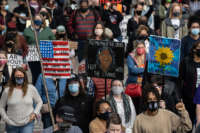By: Bailey Loosemore
It felt like winning the lottery.
Weeks after a friend suggested she apply for a new Louisville program for young adults, Tashonna learned she’d been picked to receive $500 each month for a year — support that couldn’t have come at a better time as she pursued a psychology degree while helping out her family.
The program is a guaranteed income pilot led by Metro United Way, which will distribute $900,000 total to 150 young adults in three Louisville neighborhoods through March, with no requirements for how the money is spent.
And when she heard she’d been selected to take part, “the first thing that came to my mind was just pure joy,” said Tashonna, 24, who requested her last name not be published because some guaranteed income recipients have been harassed.
Background: Guaranteed income programs are expanding across the nation. What can Louisville expect?
Six months in, people involved with the program say it’s already having positive effects for the predominantly Black, low-income individuals receiving the money.
One participant was able to move his haircutting business out of his home and into a professional space, said Colleen Reilly, project manager for economic mobility with Metro United Way.
Another was able to start a construction certification course while expanding his yard maintenance business. And Tashonna was able to take on added family responsibilities without dropping classes at the University of Louisville.
“The extra $500 does take a lot of stress off of you,” Tashonna said.
“It gives you a really big cushion to just like make those decisions. If I have $500, do I still need another job or is this enough for me?”
Louisville’s pilot is one of 30 selected for funding from Mayors For A Guaranteed Income, a group of city leaders advocating for a nationwide program that could help people pursue education or job opportunities by relieving their immediate financial strains through unrestricted payments.
Such programs, proponents say, can help stop the cycle of poverty that disproportionately impacts Black residents by enabling people to reach their full potential.
“This is part of our trust-based philanthropy model we’re leaning into,” Reilly said. “We trust individuals to know what they and their families need the most and that they will spend the money according to what they need.”
Metro United Way and Mayors For A Guaranteed Income have split the $900,000 needed for Louisville’s program, while Louisville Metro Government contributed $100,000 toward administrative expenses.
Metro United Way is tracking participants’ spending and outcomes, in coordination with other pilot programs. And Reilly said the nonprofit anticipates releasing an evaluation in early 2024.
Louisville’s program — known as YA Lift! — was open to young adults ages 18 to 24 in three majority Black, high-poverty neighborhoods: Russell, Smoketown and California.
More than 1,000 people applied for the program, and 150 were randomly selected to receive payments.
According to program data, 91% of the recipients are Black, 4% are white and 5% identify as another race. Their average age is 21 and average household size is three.
Maya White, a senior associate at Cities United, which partnered with Metro United Way on the pilot through Russell: A Place of Promise, helped develop Louisville’s program and said it’s an important step toward “investing in our future leaders.”
‘It’s been there too long’: Why some fear redesign isn’t enough to end Ninth Street divide
Young adults in communities stifled by systemic racism and high poverty rates often don’t have the financial support they need to take risks or pursue careers that can change their income trajectory, White said.
“So this is us providing an income lift or some cushion to say take care of your basic needs, and if there’s an opportunity for you to reach your potential, then do that,” she said.
“… That’s what young people deserve.”
Kal Carey, chief operating officer for YouthBuild, another partner in the pilot, met Tashonna through the program and said he’s already noticed a difference in “her spirit.”
“She’s already a fine young person,” he said. “But I think it’s supported her motivation. It’s increasing esteem, reducing anxiety. People may not understand the level of anxiety young people face in getting their lives started.”
Tashonna now works with YouthBuild’s Urban Conservation Corps, along with a second job at the University of Louisville and delivering food in her spare time.
She said she hopes by the end of the program she’s found one job that pays enough to cover all her needs. And she hopes the program continues for others in similar positions.
“When you think about whether we should have the $500 or not, think about your community and how you would want it to look,” she said. “Would you want it to be full of unhappy people with strife and struggle? Or would you want people to live peacefully?”
This post was originally published on Basic Income Today.
